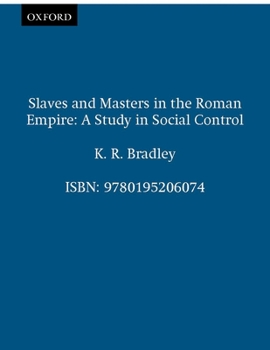Slaves and Masters in the Roman Empire: A Study in Social Control
Select Format
Select Condition 
Book Overview
This ground-breaking book is the first to show how the institution of slavery, one of the most characteristic and enduring features of Roman imperial society, was maintained over time and how, at the practical level, the lives of slaves in the Roman world were directly controlled by their masters. The author demonstrates, first, how the tensions generated between slaves and masters can be perceived in the ancient sources, and, second, how those tensions were dealt with, as masters treated their slaves with varying forms of generosity and punishment in order to elicit obedience from them. Special attention is given to the slaves' family lives, to their acquisition of freedom through manumission, and to the climate of violence that surrounded them. Emphasizing the harsh realities of Roman slavery in a new way, this important book will stir intense debate among scholars and students.
Format:Paperback
Language:English
ISBN:019520607X
ISBN13:9780195206074
Release Date:October 1987
Publisher:Oxford University Press
Length:168 Pages
Weight:0.64 lbs.
Dimensions:0.5" x 6.7" x 9.2"
Customer Reviews
2 ratings
Fascinating speculation about how slaves were controlled
Published by Thriftbooks.com User , 16 years ago
Bradley asks how the Romans controlled their slaves. He discovers that "It is indisputable that physical coercion from the owner played a large part in servile life...and that subjection to brutality was a basic component of slavery" (p 122). There were all kinds of slaves, from the workers in the mines, who apparently endured unbelievable cruelty, to the pampered nannies of the rich. It is difficult to truly understand Roman slaves since there is no slave literature (p 18). However, we have the records which have been left, and the advice about slaves left by wealthy landowners. Slaves appear to have been considered utterly base by their owners. The owners had a long litany of complaints about their slaves. They stole; they lied; they were lazy, were common complaints. Although Roman law forbade slaves to marry, slaves of course did form families, although they could be sold at any time. There appear to have been many more male slaves than female ones (p 73). Some were later freed, perhaps by wills, or perhaps by saving up enough money to buy their own freedom. "Domitian first forbade the castration of slaves" ( 128), although eunuchs were ubiquitous for centuries. A fascinating book.
an excellent book
Published by Thriftbooks.com User , 24 years ago
This book is an excellent introduction to the social condition of slavery in the Roman world. The only thing lacking is more of a historical sense of how things changed and why. Bradley does a good job of balancing the "master" view with the "slave" view, presenting several sides to each issue without much moralizing of his own -- a rare thing often in the history of slavery. A good book for both undergraduate and graduate and a good basic text to begin research from.






